Back to Berlin
October 18, 2013 § 3 Comments
Berlin and I have a long history together. I’ve visited it during each of the three lives I’ve led so far here in Germany.
I went there the first time a young student on a birthday trip to finally see the new-old capital of the country in which I’d already lived and studied for a couple of years. It was a young, spontaneous girl who fell in love with that city, a city that had not belonged much longer than I to Germany, meaning West Germany, meaning reunited Germany, meaning…everything was moving toward something, everything was transforming, and the city swallowed you and injected cement and bricks into your veins and built a new thing out of you.
So this first trip was all about museums and sightseeing: Pergamon Museum, National Gallery, Reichstag, Alexanderplatz, Potsdamer Platz, the future government district, a boat ride on the Spree, Checkpoint Charlie…you name it! Berlin and I welcomed each other to Germany and to Europe.
It was almost a decade later, in my second life, when I was there experiencing my 15 minutes of fame, sort of. After winning a European contest, I’d written a screenplay and had even managed to sell it. Now it was in pre-production with two companies, one Greek, the other German. I was in Berlin often — at the Berlinale, too, of course, and in the fine hotel lobbies nearby — discussing, planning, developing (the proper screenwriting term) my script. But my three years of work ended pretty unspectacularly after one company fired my producer and the other company refused to work with the new producer, a scenario familiar to anyone who knows something about the movie business.
My script (a coming-of-age story in the highly politicised climate of the early ’80s in Greece) was buried deep in the foundations of Berlin’s new buildings. Naturally, I was sad and frustrated then, but in retrospect, those were great times in Berlin and I’m quite thankful for the experience. Prenzlauer Berg, not yet the hip place for cultural elites who can afford it, was in the exciting phase of becoming that, so this life in Berlin was all about living: making new friends, drinking at the Oranienburger Straße, dancing and clubbing, being creative, becoming as new and as interesting as the city itself was becoming.
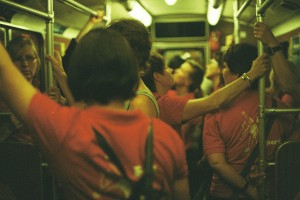
And now? Who is this woman who revisits Berlin to celebrate her personal anniversaries? A partner, a mother, a lover, a teacher, a poet, a mourner — I’ve been all of these since I was here last, and I’m likely to be any one of them again at any given time. I return now to Berlin and find a very self-confident city, still full of construction sites, but no longer the kind that can repair deep wounds from the past; more like the kind that cosmetically restore good looks to those of advanced age. For Berlin, although bankrupt, is the capital of a rich and now very powerful Germany.
I walk around the city for hours, taking photos. There’s still plenty of alternative life here, but I get the feeling that this most exciting and creative metropolis is a less thoughtful city than it used to be. Culture and politics have been smoothly reintegrated into its daily routine. Europe is still far away, but when contact is necessary, it’s Europe who comes calling.
The German election is a week away and political parties’ posters are all over the place. Some of them are painful for me — reminding me why I feel more like a stranger in Germany now, after 22 years, than I did early on — the posters that use the Greek crisis as a campaign slogan. These are from the new Eurosceptic party that ultimately missed entry into the Bundestag, but nevertheless represents (like Golden Dawn in Greece) the damage the financial crisis has caused to both countries’ belief in the European Union. Now the smaller countries know they’re small, and alas, the big ones officially know they’re big, and I’ve felt quite in the middle of all of this for some time now.
The only “sight” I took in this time in Berlin is one that was unfinished the last time I was here: Das Denkmal für die ermordeten Juden Europas, or the Memorial to the Murdered Jews of Europe. There had been much discussion before and during its construction about its aesthetics and their impact, its location, and the exclusion of other groups the Nazis murdered, but now it is there, next to the Brandenburger Tor, and it is powerful indeed. Depending on one’s perspective, the stones turn into a graveyard, or a petrified forest, or even a playground for people who leap from one to the other. The American Embassy stands pompously on one side, and the line of souvenir shops and fast-food restaurants on the other, as constant reminders of our current (and often indifferent) times. But if one takes a seat on a stone and looks toward the third side, there where the stones go all the way down to the Tiergarten, there where their grey seems most cold against the green of the trees, one remembers: these stones now stand for those who were once most alive here.
I also visited the underground Information Centre where the names of the Jewish Holocaust victims are kept and the personal stories of six European Jews are told representatively for the six million murdered. In the Room of Families, where the fates of 15 Jewish families from all over Europe are presented, I stayed a very long time in front of the Greek Jewish family. One of its female members survived because she took a false name and Greek Orthodox identity and went into hiding in Athens. As it happens, my maternal grandfather had provided shelter for a Jewish Greek woman and her son during the occupation in Athens, too, so I read and carefully reread this woman’s false name, trying to remember whether it bore any relation to the names I knew.
In the evening, after the Literature Festival’s reading that transported me to Bombay (a mental journey worthy of its own post), I return to Berlin — to my hotel, my age, my gender, my time — and I am alone. I understand I came to Berlin to be exactly this: alone.
I stand naked in front of the huge mirror opposite my bed, and I look at me. Does this city recognize me? Do I?
I turn on the music and go to bed, not lonely.
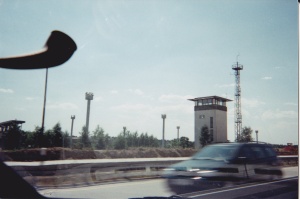
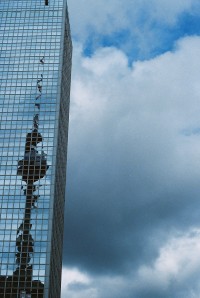
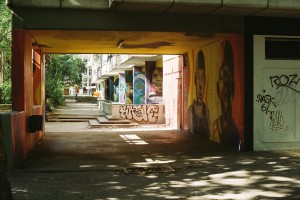
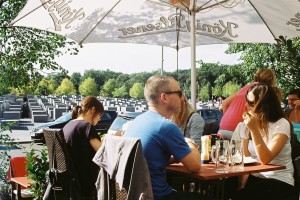
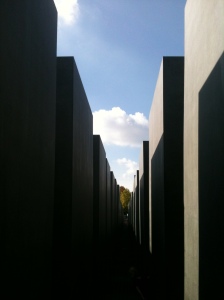
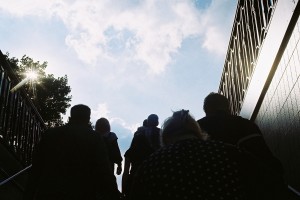
Gratitude to M. (@DeathZen on Twitter) for being an encouraging editor for many of my travelogue posts.
LikeLike
This is wonderful. Thank you! I’ve still never visited Berlin…
LikeLike
Beth, your blog, Cassandra Pages, is one of those I try not to miss reading. I agree with what you wrote in your Ms. Green Eyes post: I, too, am most interested in content when spending time online now. So thanks for considering *my* pages here content enough to always come back. x
LikeLike